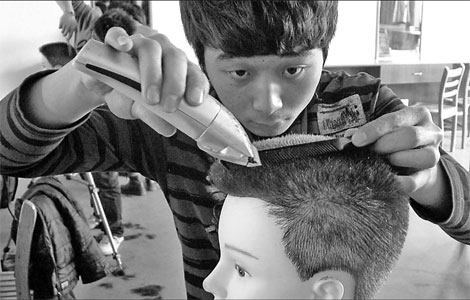Life and Leisure
Learning the hard way
By Mei Jia (China Daily)
Updated: 2010-09-16 08:00
 |
Large Medium Small |
|
A student majoring in hairdressing, from a Hefei vocational school in Anhui province, gives a model a haircut during an occupational skills competition. Fu Jun / Asia News Photo |
Vocational schools that typically attract problematic, underachieving junior and senior high schoolers, are seeing a different kind of student. Mei Jia reports
Liu Jingjia takes little pride in her profession. "Every time I introduce myself as a teacher, the first reaction is one of respect and interest, but the moment I add that I teach at a vocational school, people just don't want to know more," Liu says.
The 32-year-old has been teaching for 10 years at Yunnan Provincial Tourism School.
Unlike teachers at regular schools and universities, vocational school teachers like Liu are acutely aware of their poor pay, few opportunities for professional advancement and uninspired students, every day of their teaching life. The lukewarm reactions from society only feed their dispiritedness.
Liu's salary has remained almost unchanged for a decade and she seldom has access to officially sponsored research projects that bring in funds. Teachers like her also rarely appear in the list of national-level prizewinners.
"We're the most neglected group of teachers," Liu's colleague, Wu Leping says.
However, Liu says most of her frustrations are due to her students.
"Although I try to be appealing, facing a noisy classroom of absent minds, I get upset and the passion vanishes," she says.
Once she was asked to tape-record her class and was shocked to discover in the replay that she spent most of her time trying to get her class to be quiet and attentive.
Her students are mostly underachievers from primary, and junior high schools. They are low scorers, badly behaved, and lack self-confidence.
The insistence on higher-education certificates at work, parental pressures and growing college enrolments have made vocational schools the last choice of students graduating from junior and senior high school, the teacher says.
"Only the ones with no other choice enroll in vocational schools," she says.
These students are also often problem adolescents, who are a headache for parents, and this adds to the difficulties of schools and teachers in managing them.
"There are times when we joke that our job is to remold the students, or have others (the police) finish the job," she says.
But in recent years, a marked change has occurred in the vocational education scene, owing partly to society's changing mindset and partly to the fact that even university graduates are finding it tough to land a job.
Vocational schools are increasingly seeing a different type of student.
Shi Ying, 17, majoring in recreational services, is studying to become a golf caddie in Liu's school. She decided against regular high school to "avoid the risk of entering university and still being jobless". She says many others are making a conscious choice to join a vocational school.
"Although my father opposed my decision at first, I talked him into it by pointing out that it was better to master one skill than know a little about everything," Shi says.
She says she does not want to end up as an educated unemployed, living off her parents.
Liu, the teacher, notes that over the past three years, her school has more people with degrees or work experience enrolling to further enhance their skills.
"There are a number of youngsters with bachelor's and master's degrees in a society that actually needs more technically-trained people," she says.
Jia Shaohua, a pioneer in reforming vocational education, has also witnessed the same trend.
Jia is executive vice-president of the Yiwu Industrial and Commercial College, a county-level vocational college in Zhejiang province. His successful trials in training students in e-business are legendary and most students enrolling in his school end up hiring university graduates in their business.
"We started in 2005, when e-commerce started to boom. Since then, what was the most unwanted school in Yiwu has been attracting 500 local students a year, compared to some tens of students previously," he says.
"The facts speak for themselves," he says, and adds even freshmen in the school's four Starting Business classes are able to earn 10,000 yuan ($1,471) a month.
Jia sees his most important task as restoring his students' confidence and helping them realize their full potential. He points out that vocational schools need to constantly update to cater to the new cohort of students they attract.
The newly released final draft of the National Plan for Long-Term Educational Reform and Development (2010-2020) shows official resolve to advance vocational education, recognizing the key role it can play in easing pressures caused by imbalances in the labor market.
The plan calls for raising compensation for teachers in vocational schools and strengthening their links to industry.
Liu cheers these initiatives, knowing well the importance of practical experience for her students.
"I have always wanted to teach more but felt powerless. With the new push, all this will change, " she says.
